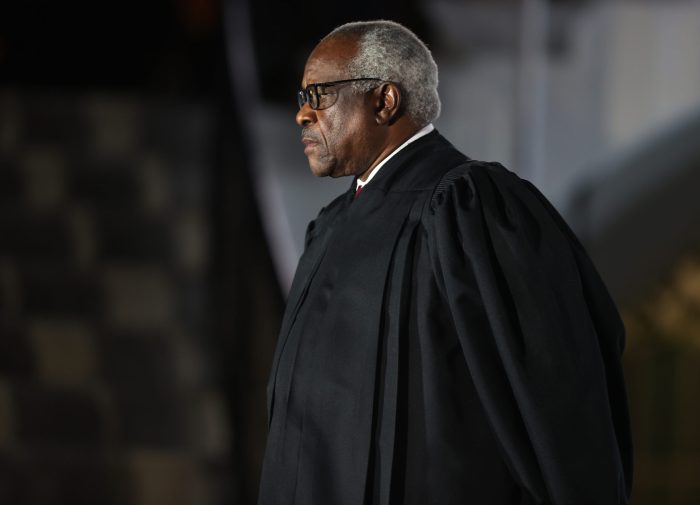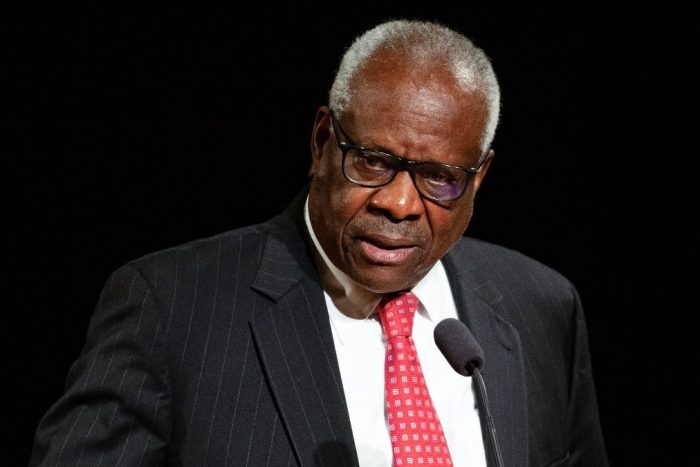Clarence thomas warns of domino effect – Clarence Thomas, Associate Justice of the Supreme Court, issued a warning about the potential for a domino effect within the legal system. His concerns stem from the interconnected nature of legal precedents and the potential for seemingly minor changes to have far-reaching consequences.
Thomas’s warning highlights the importance of considering the long-term implications of legal decisions and the need for caution when altering established legal principles.
Historical Context of Clarence Thomas’s Warning

Clarence Thomas, an Associate Justice of the Supreme Court, issued a warning about the potential for a domino effect in legal and societal matters. This warning must be understood in the context of his position and the legal and societal landscape of the time.
Significance of Thomas’s Position
As an Associate Justice of the Supreme Court, Clarence Thomas holds a position of significant influence in the American legal system. His rulings and opinions shape the interpretation and application of the law, affecting both legal precedent and broader societal norms.
Legal and Societal Landscape
During the time of Thomas’s warning, the legal and societal landscape was characterized by a heightened focus on issues such as affirmative action, abortion rights, and the separation of church and state. These issues were highly contentious, with strong opinions and differing perspectives held by various groups in society.
Domino Effect Theory

Concept of the Domino Effect
The domino effect refers to a phenomenon where one event triggers a series of subsequent events, each of which is caused by the one before it. In the context of legal and political systems, the domino effect suggests that a single change or ruling can lead to a cascade of unforeseen and potentially unintended consequences.
Historical Examples
- The fall of the Berlin Wall in 1989, which triggered a wave of democratic revolutions in Eastern Europe.
- The assassination of Archduke Franz Ferdinand in 1914, which led to the outbreak of World War I.
Thomas’s Specific Concerns: Clarence Thomas Warns Of Domino Effect
Legal and Social Issues
Thomas’s warning specifically focused on the potential for a domino effect in the areas of affirmative action, abortion rights, and the separation of church and state. He argued that changes in these areas could lead to a weakening of established legal protections and a shift in societal values.
Reasoning and Consequences
Thomas reasoned that affirmative action policies, which aim to address historical discrimination, could be eroded if the Supreme Court were to rule against them. He also expressed concerns that abortion rights, which had been established in the landmark case Roe v.
Wade, could be overturned, leading to a restriction of women’s reproductive freedom. Additionally, he warned that the separation of church and state could be weakened, allowing for greater religious influence in public life.
Impact and Legacy of Thomas’s Warning
Immediate Reactions and Debates
Thomas’s warning sparked immediate reactions and debates among legal scholars, policymakers, and the general public. Some agreed with his concerns, while others argued that he was exaggerating the potential risks. The warning became a focal point in discussions about the role of the Supreme Court and the potential consequences of its rulings.
Long-Term Impact
In the long term, Thomas’s warning has had a lasting impact on legal and political discourse. It has contributed to ongoing debates about the limits of judicial power, the importance of precedent, and the potential for unintended consequences in legal decision-making.
Contemporary Relevance of the Domino Effect

Continued Relevance
The domino effect theory remains relevant in modern legal and political contexts. It serves as a reminder that seemingly isolated events or rulings can have far-reaching and unpredictable consequences.
Current Issues
- The overturning of Roe v. Wade by the Supreme Court in 2022 has raised concerns about the potential for a domino effect on other rights, such as same-sex marriage and access to contraception.
- The rise of populism and authoritarianism around the world has led to fears of a domino effect, where democratic institutions are weakened or dismantled one by one.
Comparative Perspectives
Similar Warnings
Clarence Thomas’s warning about the domino effect is not unique. Other legal and political figures have issued similar warnings throughout history.
James Madison
In Federalist Paper No. 10, James Madison warned about the dangers of “factions,” or groups of people with common interests that could use their power to oppress others. He argued that a strong central government was necessary to prevent the formation of factions and the potential for a domino effect of oppression.
Alexis de Tocqueville
In his book “Democracy in America,” Alexis de Tocqueville expressed concerns about the potential for “tyranny of the majority” in democratic societies. He argued that the majority could use its power to suppress the rights of minorities, leading to a domino effect of oppression and the erosion of individual liberty.
Implications for Legal Decision-Making

Consideration of Domino Effect
Thomas’s warning about the domino effect can influence legal decision-making processes by encouraging judges and policymakers to consider the potential long-term consequences of their rulings.
Benefits and Drawbacks, Clarence thomas warns of domino effect
- Benefits:Considering the domino effect can help prevent unintended consequences and promote thoughtful decision-making.
- Drawbacks:It can be challenging to accurately predict the full range of potential consequences, and overly cautious decision-making may stifle progress.
FAQ Compilation
What is the domino effect in the legal context?
The domino effect refers to the potential for a seemingly minor legal change to trigger a series of subsequent changes, each with its own consequences, leading to a cumulative and potentially significant impact on the legal system.
Why did Clarence Thomas warn about the domino effect?
Thomas expressed concern that overturning established legal precedents could lead to a chain reaction, undermining the stability and predictability of the legal system.
What are the potential consequences of the domino effect in the legal system?
The domino effect can result in legal uncertainty, a loss of public confidence in the legal system, and the erosion of fundamental rights and freedoms.